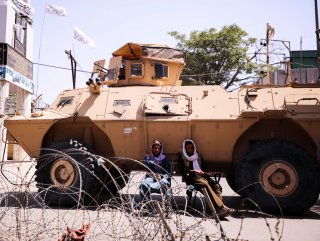Joe Biden's Over-the-Horizon Counterterrorism Is Counterintuitive
Salafist groups represent a thinking and clever enemy; those that survive have had to adapt.
Here's What You Need To Remember: Widespread situational awareness can thicken the fog of war as much as dispel it.
In his class The Soldier and the State, Samuel Huntington warned of the limitations of strategic “monism,” an overreliance on a single means or method of operations. No matter how successful a tactic or technology has been in the past — or presently remains — this approach depends upon the enemy being conveniently predictable.
There is perhaps no better example of the problems of the monist fallacy than “over-the-horizon” counterterrorism. Addicted to the illusions of precision, low risk of casualties among one’s own forces, and the immediate gratification of dramatic strike video and special operations raids, the US military — or, more accurately and dangerously, their civilian masters — believes that such operations are an effective way to suppress terrorist groups. In his July announcement confirming the complete withdrawal of American troops in Afghanistan, President Biden boasted that “we are developing a counter-terrorism over-the-horizon capability that will allow us to keep our eyes firmly fixed on any direct threats to the United States in the region, and act quickly and decisively if needed.”
To be sure, if the Taliban hosts the return of a Tarnak-Farms-style al Qaeda training post or reverts to its past practices, we’d know about it — indeed, we knew about such things in 2001 and before, but neither conceived it to be a proximate threat nor were the relevant government agencies attuned to taking action. But Salafist groups represent a thinking and clever enemy; those that survive have had to adapt.
More importantly, standing off over the horizon will both delay and obscure intelligence gathering and slow response times. It will also introduce complexity and centralization in command decision-making — the final approval for strikes frequently falls to a legal officer or the White House itself. Widespread situational awareness can thicken the fog of war as much as dispel it. Indeed, the most modern “over-the-horizon” ways of war have tended to dull leaders’ “finger-tip feel,” what the Germans called fingerspitzengefühl, for the battlefield, reducing the human struggle of war to quantifiables like body counts, misleading with a false sense of certainly and precision. Strategic monism often exposes a single point of failure.
Giselle Donnelly is a senior fellow in defense and national security at the American Enterprise Institute (AEI), where she focuses on national security and military strategy, operations, programs, and defense budgets. This article was first published by the American Enterprise Institute.
Image: Reuters.

